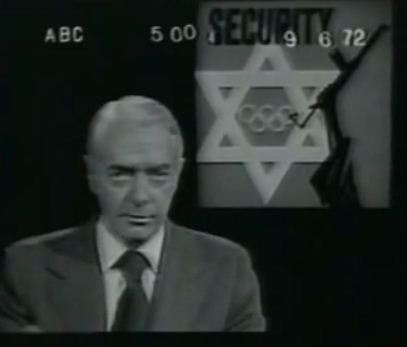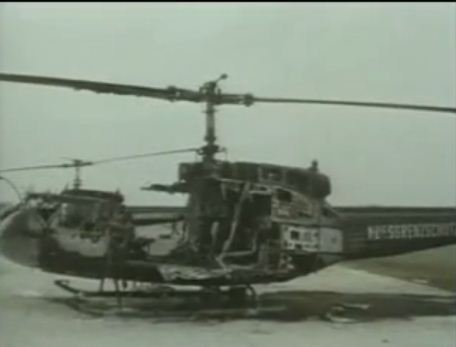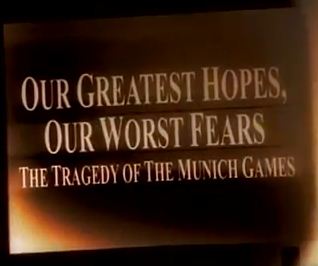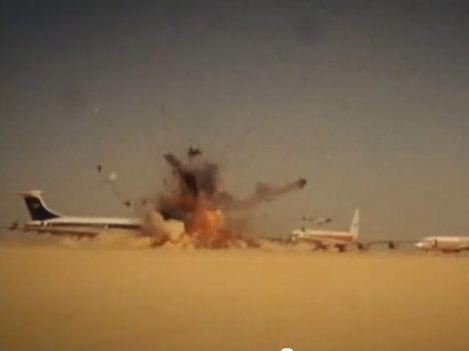 Websites
Websites
|
|
|
|
|
Olympic security debacle: 40 years on
The humiliating and extremely serious lapse in 2012 Olympic security arrangements is not a new phenomenon. There is at least one people group which can painfully testify to that fact.
 Very sadly we see again how dangerous our world has become when a convivial international sporting event needs the highest level of military involvement to counter the threats posed by terrorists. And the current major weakness in security arrangements surrounding the 2012 Olympics resonates back over a period of 40 years. Very sadly we see again how dangerous our world has become when a convivial international sporting event needs the highest level of military involvement to counter the threats posed by terrorists. And the current major weakness in security arrangements surrounding the 2012 Olympics resonates back over a period of 40 years.
In 1972 Germany was the host nation for the summer sporting extravaganza; held between 26 August and 10 September. Mindful of the previous German Olympics held in Berlin in 1936 under the Nazi regime, the West German Government was anxious to take the opportunity of the 72 Olympics in Munich to present a new, democratic and optimistic Germany to the world. In this context the organisers planned the major international sporting event around the official slogan as being ‘the Happy Games’. However and tragically , they turned out to be anything but that.
On 5 September a group of eight armed Palestinian terrorists disguised as athletes breached the ‘relaxed’ security arrangements at the Olympic Village to take members of the Israeli team captive – holding them against demands that Israel release over two hundred Arab militants from Israeli jails. In the first minutes the ‘Black September’ group killed two Israelis and held a further nine as hostages.
Neither the Israeli nor German governments wanted to give in to the terrorists’ demands but arrangements were made for the group and their captives to be taken to German air force base; ostensibly to then be flown out to an Arab country.
 However when the two German helicopters arrived at the airport with the attackers and their victims, German police marksmen opened fire. But, the operation was bungled. Due to a failure in determining the exact number of terrorists, there was an insufficient number of marksmen to achieve a decisive and comprehensive outcome. While some terrorists were shot, others survived to return fire. However when the two German helicopters arrived at the airport with the attackers and their victims, German police marksmen opened fire. But, the operation was bungled. Due to a failure in determining the exact number of terrorists, there was an insufficient number of marksmen to achieve a decisive and comprehensive outcome. While some terrorists were shot, others survived to return fire.
During the ensuing gun battle one of the militants shot four of the athletes who were tied up in one of the helicopters. He then incinerated them using a hand grenade. The five remaining hostages were machine-gunned by another terrorist. The total death toll was eleven Israelis, five terrorists and one German policeman.
The news shocked the world. While the Games did go ahead after a 24-hour delay and a memorial ceremony, the remainder of the Israeli team immediately returned home following the attack.
Terrorists released
Three of the terrorists were captured alive, only to be released shortly afterwards. On 29 October, just seven weeks later, a Lufthansa airliner left Damascus, Syria, bound for Frankfurt, Germany, with a stop in Beirut. Two Black September terrorists boarded the plane and demanded to be flown to Munich. They called for the release of the three captive terrorists. Without consulting the Israeli government, the German Chancellor Willy Brandt had the terrorists released saying, "The passengers and crew were threatened with annihilation . . . I then saw no alternative but to yield to this ultimatum and avoid further senseless bloodshed."
Given that the original 'Munich' demands included the freeing of members of the Baader-Meinhof Gang held in German jails, some questions have been asked regarding the possibility of a deal being struck between Germany and the Palestine Liberation Organisation (PLO) – with the release of the Munich terrorists in return from a promise from the PLO to stay out of Germany.
 The Munich massacre led the German federal government to re-examine its anti-terrorism policies, which at the time were dominated by a pacifist approach adopted post-World War II. This led to the creation of the elite counter-terrorist unit GSG 9, similar to the British SAS. The Munich massacre led the German federal government to re-examine its anti-terrorism policies, which at the time were dominated by a pacifist approach adopted post-World War II. This led to the creation of the elite counter-terrorist unit GSG 9, similar to the British SAS.
Raw memories
In Israel the resonance with the murdering of Jews on German soil during the Holocaust had a profound effect on the nation. In response, the Israeli Prime Minister Golda Meir and her government launched an aggressive counter-terrorism campaign known as Operation Wrath of God. Those suspected of involvement in the Munich operation were systematically tracked down and assassinated. Amongst the Israeli actions, in 1973 an innocent waiter in Norway was mistakenly murdered in what became known as the Lillehammer affair. The operation has continued long after Golda Meir’s death and, it is thought, through to the present day.
Of those believed to have planned the massacre, only Abu Daoud, the man who claims that the attack was his idea, is known to have died of natural causes. He died on 3 July 2010 in Syria of kidney failure at the age of 73.
Two of the three surviving gunmen, Mohammed Safady and Adnan Al-Gashey, were apparently killed by the Mossad as part of Operation Wrath of God.
The prevailing belief is that Jamal Al-Gashey is the sole remaining gunman alive, as of February 2012, hiding in North Africa or in Syria, claiming to still fear retribution from Israel.
The story of the Munich Massacre and the subsequent Israeli response has been dramatised in two films: the first was the 1986 made-for-TV movie Sword of Gideon (1986) and the second was Steven Spielberg's 2005 film Munich.
See report 'Olympic Moments: Black September, Munich 1972' from BBC Commentator Barry Davies who was covered the 1972 games.
Footnotes:
 1. The name ‘Black September’ derives from the expulsion of Yassir Arafat and his Palestinian ‘Fatah’ group from their adopted base in Jordan. 1. The name ‘Black September’ derives from the expulsion of Yassir Arafat and his Palestinian ‘Fatah’ group from their adopted base in Jordan.
In a staged drama on 12 September 1970, with a British TV crew capturing the event, Palestinian terrorists blew up three hi-jacked airliners. The pictures were beamed around the world. And Arafat gained the epithet 'the father of international terrorism'.
In this most serious challenge to his authority and country, King Hussein declared martial law on 16 September as a first move towards the expulsion of the guerrillas from Jordan. The combined actions created an armed conflict lasting until July the following year. The situation nearly triggered a regional war involving Syria, Iraq, and Israel; with potentially global consequences as the US and the (then) USSR were drawn in.
The PLO relocated to Beirut. Its presence there was one of the main reasons for the civil war which broke out Lebanon in 1975, and has continued spasmodically through to the present day.
|
Christians Together, 18/07/2012
|
|
|
|